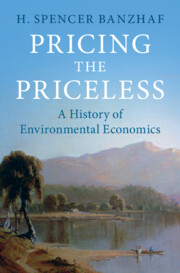Book contents
- Pricing the Priceless
- Historical Perspectives on Modern Economics
- Pricing the Priceless
- Copyright page
- Dedication
- Contents
- Figures
- Acknowledgments
- Acronyms
- Prologue
- 1 Introduction
- 2 Conservation and Preservation
- 3 Do Economists Know about Lupines? Economics versus the Environment
- 4 Consumer Surplus with Apology
- 5 John Krutilla and the Environmental Turn in Natural Resource Economics
- 6 Pricing Pollution
- 7 Lives, Damned Lives, and Statistics
- 8 Benefit–Cost Analysis: Objective or Multi-objective?
- 9 Constructing Markets
- Epilogue
- References
- Index
- Other Books in the Series
5 - John Krutilla and the Environmental Turn in Natural Resource Economics
Published online by Cambridge University Press: 19 October 2023
- Pricing the Priceless
- Historical Perspectives on Modern Economics
- Pricing the Priceless
- Copyright page
- Dedication
- Contents
- Figures
- Acknowledgments
- Acronyms
- Prologue
- 1 Introduction
- 2 Conservation and Preservation
- 3 Do Economists Know about Lupines? Economics versus the Environment
- 4 Consumer Surplus with Apology
- 5 John Krutilla and the Environmental Turn in Natural Resource Economics
- 6 Pricing Pollution
- 7 Lives, Damned Lives, and Statistics
- 8 Benefit–Cost Analysis: Objective or Multi-objective?
- 9 Constructing Markets
- Epilogue
- References
- Index
- Other Books in the Series
Summary
John Krutilla, an economist at Resources for the Future, wanted economics to overcome the impasse left behind by the schism between Gifford Pinchots conservationism of resources for human ends and John Muirs preservation of the environment for its own sake. In the 1960s, even as Krutilla was working on these issues, economics was redefining itself from the study of material welfare to the study of opportunity costs and tradeoffs. Making use of this redefinition, Krutilla pushed economics to the point that it could embrace Muirs vision as well as Pinchots. He argued that if humans preferred a preserved state to a developed one, then such preferences were every bit as economic as development. Either way, there were opportunity costs and an economic choice to be made.
Keywords
- Type
- Chapter
- Information
- Pricing the PricelessA History of Environmental Economics, pp. 98 - 119Publisher: Cambridge University PressPrint publication year: 2023

